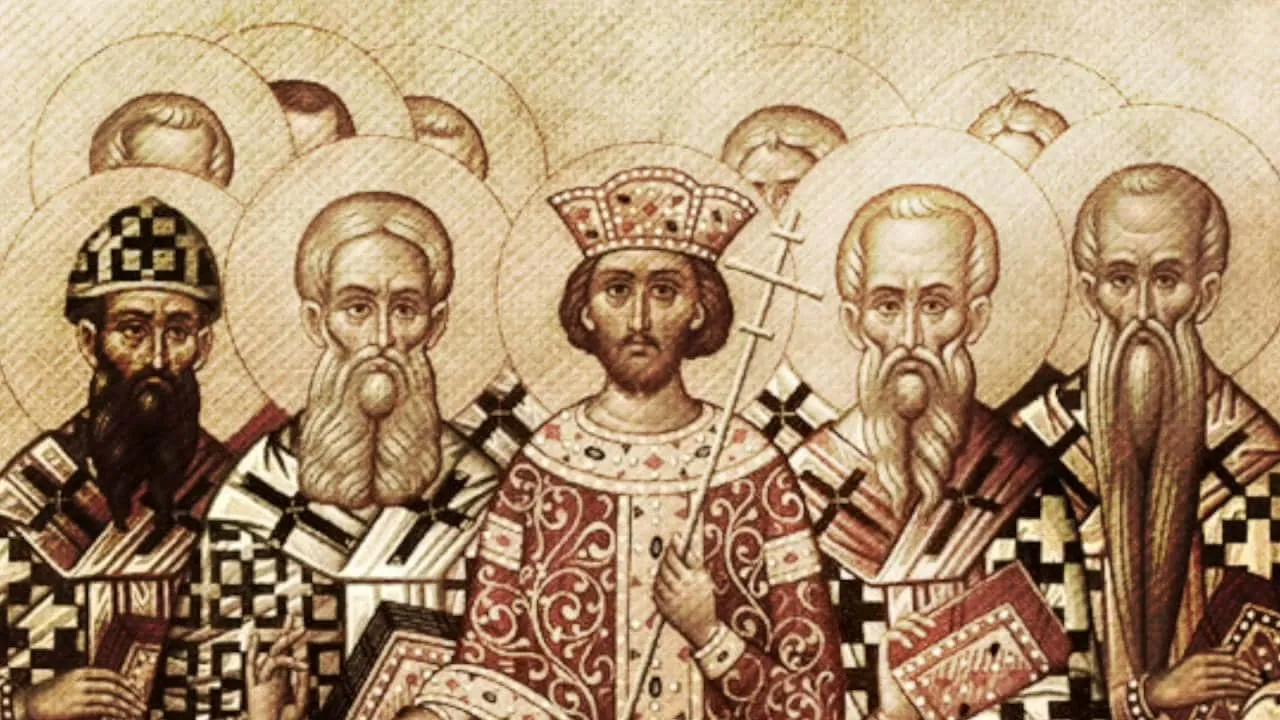The Council of Nicaea: History and Christian Importance
The Council of Nicaea , it is a kind of commission or as its name indicates a Council among 318 bishops together with the emperor Constantine, which sanctioned all those who were against the belief that Jesus was not God or son. of God. So in the following article you will know everything about what happened to this council and why it was created.
I Council of Nicaea
The First Ecumenical Council of Nicaea or also called the First Ecumenical Council was Convened by Emperor Constantine the Great against all Arians. The same took place in the regions of Nicaea in the year 325 with the assistance of 318 bishops.
Causes of the Council
Once meeting the emperor Constantine in the course of the pontificate of San Silvestre. Against what was then Arianism. He defined the consubstantiality of the Word, which was extensively defended by Athanasius, the deacon of Alexandria; which sanctioned the privileges of the 3 patriarchal seats of:
- Rome
- Alexandria
- antioch
And he came to extend to the entire Church what was the Roman custom by agreeing on the date of the celebration of Easter. The Word becomes the true Son of God, of the same substance as the Father, and therefore he is the true God.
Arian controversy
Arius at all times denied the divinity of the Son, which he called “consubstantial” with the Father. If Jesus was born, there was then a time when he did not exist. If He becomes God, there was a time then when He didn’t. The Council declared the teachings of this man named Arius as a kind of heresy unacceptable to the Church and which decreed that Christ is God, being of the same essence with God the Father.
The creed
The first part of the 7 articles of the Creed came to be ratified in this First Ecumenical Council of Nicaea which was as follows: We believe in one God, Almighty Father, creator of heaven and earth, of all visible things and invisible. And in one Lord Jesus Christ, the only begotten Son of God, born of the Father before all ages. light of light; true God of true God; born, not made; consubstantial with the Father, through whom everything was made.
That for us men and for our salvation he descended from heaven and became incarnate of the Holy Spirit and of the Virgin Mary, and became man. He was crucified under Pontius Pilate, suffered and was buried. He rose on the third day, according to the scriptures; and he ascended into heaven, and he is seated at the right hand of the Father; and again he is to come in glory to judge the living and the dead; and his kingdom will have no end.
This Council came to sanction all the privileges of the 3 patriarchal sees of Rome, Alexandria and Antioch, and it was also the one that extended the Roman custom to the entire Church, deciding the date of the celebration of Easter.
The Nicene Symbol
Among the Nicene symbols there are 2 classes that are: 1 in the Greek Text version and the other in the Hilary of Poitiers Version. Which are found as follows:
- Version on the Greek Text
“We faithfully believe in 1 only God the Almighty Father, the creator of all things, of the visible and also of the invisible; and in one Lord who is the Lord Jesus Christ Son of God, born as the only begotten of the Father, that is to say, of the substance of the Father, the God from God, light from light, the true God from true God, begotten, not fact, which is consubstantial with the Father, by whom all things came to be made, those that are in heaven and those that exist on earth.
That for all of us men and also for our salvation he descended and became incarnate, who became man, who suffered, and also rose again on the third day, ascending into heaven, and will come to judge the living and also to the dead. And in the Holy Spirit. But to those who affirm: There was a period in which it did not come to be and that before being engendered it was not, and that it was made from nothing, or those who come to say that it is of another hypostasis or of another substance or that the Son of God becomes changeable or is changeable, the Catholic Church anathematizes them.
- Hilary of Poitiers version
“We believe in 1 God alone, the almighty Father, the maker of all things that are visible and also invisible. And in 1 our Lord Jesus Christ the Son of God, who is born only begotten of the Father, that is, of the Father’s own substance, God from God, light from light, true God from true God, born, not made, of one substance with the Father (what in the Greek language is called Homousion), by whom all things have come to be made, those that exist in heaven and also on earth, who came down from his holy throne for our salvation, who was incarnated and became man, suffered and came to life on the third day, ascended into heaven and will come to judge the living and all the dead. And in the Holy Spirit.
To all those, however, who come to say: “There was a time when it was not” and: “Before I was born, it was not” , and: “That of what did not exist was made or of another subsistence or essence” , to those who go so far as to say that “The Son of God is variable or mutable” , these are completely anathematized by the Catholic Church and also by the Apostolic Church”.
Of the Baptism of the Heretics and the Viaticum of the Dying
Canon 8: About those who used to call themselves katharos or pure, that is to say, the Novatians, however, who approach the Catholic and Apostolic Church, it pleased the holy and great Council that, since they came to receive the laying on of hands, come to remain in the clergy.
However, first of all, it is advisable that they first confess in writing that they will accept and follow all the decrees of the Catholic Church and the Apostolic Church, this means that they will not deny reconciliation to those who have remarried and to those who have fallen short. in the chase.
Canon 19: Regarding those who became Paulianists and later took refuge in the Catholic Church, a decree was promulgated that they become rebaptized at all costs; and if some in the previous time came to belong to the clergy, if they appear irreproachable and also blameless, after being rebaptized, hands are laid on them by the bishop of the Catholic Church.
Canon 13: Regarding those who meet to leave this world, the old canon law will also be kept now, to know: that, if someone is going to leave this world, he should not be deprived of the last and most necessary viaticum . However, if after being in a desperate state and having obtained communion, he should again come back from the living, place yourself among those who only partake of the prayer.
However, in a general way and regarding anyone who comes out of this world, if he asks to participate in the Eucharist, the bishop, after the examination, must give it to him (in a Latin version it means make him a participant in the offering).
Defenders of Orthodoxy
The greatest defenders of Orthodoxy became Saint Athanasius the Great and also Saint Basil the Great. Saint Athanasius (born 297, died 373), the Father of the Church, became a valiant champion of Orthodoxy. He spent some 17 of his 45 years as Bishop of Alexandria in exile.
Saint Basil (born in the year 330 and who died in the year 379) had a natural instinct for leadership and organization. This was the one who spoke and wrote about Arianism. He became the founder of hospitals and orphanages, among other things. He also came to revise and update the Divine Liturgy.
He was the man who greatly contributed to Monasticism (East and West) and became one of the famous Fathers of Cappadocia (along with Saint Gregory of Nyssa, who was his younger brother, and Saint Gregory of Nazianzus, the great Theologian, who was his close friend). The Cappadocians, together with Saint Athanasius the Great, came to trace what is the model to express the doctrines regarding the mystery of the Holy Trinity.
The Three Hierarchs
Saint Basil, Saint Gregory Nazianzen and also Saint John Chrysostom came to be called the Three Hierarchs.
Announcement
Emperor Constantine I had come to show his sympathy for the beliefs of Christianity through what was the Edict of Milan in the year 313, by which, together with Licinius, he recognized all Christians full freedom to be able to meet and reach practice their worship without fear of suffering persecution. Later years he came to face Licinius, who came to dominate the eastern part of the Roman Empire, and who defeated him in the year 323.
Constantine became aware of the numerous kinds of divisions that came to exist within Christianity, so, following all the recommendations of a synod which is led by Osio de Córdoba in that same year, which decided to arrive to convene a type of ecumenical council of bishops in the very city of Nicaea, where the imperial summer palace was located.
The purpose of this type of council was to establish religious peace and build what is the unity of the Christian Church. One of the purposes of the council of Nicaea came to resolve disagreements that arose within the Church of Alexandria about what the nature of the Son is in his relationship to the Father:
In particular, if he became the Son, he had become “begotten” by the Father from his own being, and therefore also did not have a beginning, or else created out of nothing, and therefore came to have A beginning. Alexander of Alexandria and his disciple and the successor of Athanasius of Alexandria came to take the first position, while the popular presbyter Arius, from whom the term Arianism comes to derive, was the one who took the second.
At that time that became the main issue that used to divide Christians. Alexander and also Athanasius were those who defended that Jesus had a double nature, which consisted of the human and the divine, and that therefore Christ was true God and true man; On the other hand, in the case of Arius and Bishop Eusebius of Nicomedia, they went so far as to affirm that Christ had become the first creation of God before the beginning of all time, however, having been created, he was not God himself.
Attendees
This became the first general council in the history of the Church if one does not take into account as a council the so-called council of Jerusalem of the first century, which had brought together Paul of Tarsus and all his closest collaborators with the apostles of Jerusalem that was led by the apostle Peter and James the Just.
Emperor Constantine went so far as to invite some 1,800 bishops whose seats are within the Roman Empire (about 1,000 in the East and another 800 in the Western part of the Empire), however, only a small and largely unknown number of them was the one who attended.
Some 3 bishops who were at the council came to leave different estimates: Eusebius of Caesarea who counted more than 250, Athanasius of Alexandria who counted 318 and also Eustathius of Antioch estimated them at approximately 270. Later, Socrates of Constantinople came to record more than 300 and Evagrius of Antioch, Hilary of Poitiers, Jerome, Dionysius the Meager, and Rufinus of Aquileia recorded 318.
This number comes to be preserved in the liturgies of the Orthodox Churches and also of the Coptic Orthodox Church. Most of the bishops became Eastern, although they participated in the same way about 2 representatives of Pope Silvestre I. Arius also came to be present and some of the few defenders of his theological positions. The position contrary to this man named Arius was defended, among others, by Alexander of Alexandria himself and by his young collaborator, named Athanasius of Alexandria.
Resolutions
Despite his kind of sympathy for Arius, Eusebius of Caesarea came to adhere to the decisions of the council, accepting the entire creed. The initial number of bishops who came to support Arius was very small. After a month of discussion, on June 19, only about 2 remained, who were: Theonas from Marmarica in Libya and the 2nd from Ptolemais. Maris of Chalcedon, who initially came to support Arianism, and who accepted the creed in full.
Like Eusebius of Nicomedia, Theognis of Nice likewise agreed, except for a few statements. The council was then pronounced against the Arians by an overwhelming majority, since only Theonas and Segundo were the ones who refused to sign the Nicene symbol and they were also the ones who, together with Arius, were exiled to Illyria and excommunicated.
Another result of the Council of Nicaea itself was a kind of agreement regarding when to celebrate Easter, the most important feast of the ecclesiastical calendar, which came to be decreed in an epistle to the Church of Alexandria in which it is stated simply:
We also send you the good news of the arrangement concerning the holy Easter, this means, that in answer to your prayers this question has likewise come to be resolved. All the brothers of the East who have continued to follow the Jewish practice until now will be able to observe from now on the custom of the Romans and also of yourselves and of all those who from ancient times have come to celebrate Passover with you.
canons
The Council of Nicaea came to promulgate some 20 new laws of the Church, called “canons” (although the exact number is subject to debate), that is, immutable rules of discipline which are the following:
- Canon 1:
On the admission, support or expulsion of clerics castrated by choice or by violence (This is the prohibition of self-castration).
- Canon 2:
These are the rules that must be observed for the ordination of catechumens who are converts, always avoiding excessive haste, and also the deposition of those guilty of a serious offense.
- Canon 3:
The Prohibition to all members of the clergy to get to live with any woman, except a mother, a sister or even an aunt.
- Canon 4:
With regard to episcopal elections, the ordination of a bishop must be carried out by all the bishops of the province, however, in case of an emergency by at least 3 bishops. The confirmation must be by the metropolitan bishop.
- Canon 5:
This is regarding excommunication.
- Canon 6:
The Prevalence of the ancient customs of the jurisdiction of the bishop of Alexandria in the regions of Egypt, of Libya and also of Pentapolis, the same as those of the bishop of Rome, that of the areas of Antioch and the rest of the other provinces. Bishops should not be appointed without the consent of the metropolitan.
- Canon 7:
The Confirmation of the right of all the bishops of Jerusalem to be able to enjoy some types of honors, always recognizing him in second place in his province after that of Caesarea.
- Canon 8:
This one is regarding the readmission of Novatians.
- Canon 9:
Whoever is ordained without examination will be deposed if it is later found that he was guilty.
- Canon 10:
Lapsis that have become knowingly or surreptitiously ordered should become excluded as soon as their irregularity is known.
- Canon 11:
This is about the Penance to be imposed on the apostates of the persecution of Licinius.
- Canon 12:
This is regarding the Penance that will be imposed on all those who came to support Licinius in his war against all Christians.
- Canon 13:
It is about the Indulgence to be granted to people who are excommunicated in danger of death.
- Canon 14:
It is about Penance for all the catechumens who came to apostatize under persecution.
- Canon 15:
The bishops, like the priests and also the deacons must not go from one Church to another and must be returned if they try.
- Canon 16:
All those clerics from this moment are prohibited from leaving their church. The formal prohibition for bishops to ordain for their diocese a cleric who belongs to another diocese.
- Canon 17:
Clerics are henceforth prohibited from lending at interest.
- Canon 18:
He reminds all deacons of their subordinate position to that of the priests. They will not administer what is the Eucharist to presbyters, nor will they touch it in front of them, nor will they even sit among the presbyters.
- Canon 19:
The Paulianists (these are the supporters of Paul of Samosata) are to become rebaptized and the deaconesses to be counted among the laity.
- Canon 20:
On Sundays and on the day of Pentecost everyone should pray standing up and not kneeling.
Constantine’s Role in the Council
Constantine I, although he came to sympathize with the Christians, according to tradition did not receive baptism until he was found on his deathbed. However, he had apparently already converted to Christianity after his military victory over Maxentius in 312, as he had called on the Lord God of the Christians before going into battle. That is why he interpreted his victory as indications of the superiority of the Christian God, even though he was careful not to share this kind of interpretation with his troops.
The vision presented by Eusebius of Caesarea in what is his work “Life of Constantine” the emperor coming to participate and actively influencing the development of the council. However, the author JM Sansterre, in his work on Eusebius of Caesarea and also the birth of the Caesaropapist theory, has come to refute this kind of position, always pointing out that the actions of the Emperor Constantine came to be respectful of the issues that were of a strict competence of the council fathers.
This is reinforced by all the articles in the Catholic Encyclopedia, which maintain that Emperor Constantine I was never able to influence theological issues, since his training in this type of respect was practically nil.
On the contrary, it comes to support the same source, that Emperor Constantine I was in charge of giving the council the physical and also the political framework, in order to prevent dogmatic dissent (better known as heresies) which could actually lead to a political fracture of the Empire of that time.
Impact
After the Council of Nicaea carried out the debates on the Christological controversy, they continued for long decades and Constantine I himself and all his successors alternated their support between the Arians and also the supporters of the Nicene resolutions.
Finally, the emperor Theodosius was the one who established the creed of the Council of Nicaea as the main rule for his domain and became the one who convened the Council of Constantinople in the year 381 to clarify the formula. That type of council came to agree to put the Holy Spirit on the same level as God and also Christ, and the Trinitarian doctrine began to take shape.
The only books that were declared heretical by this same council came to be written by the doctrinal Arians, whose copies were burned after the council. The emperor came to establish a decree of capital punishment for all those who kept these books, however, there is no evidence that a large number of deaths were caused by this.
If our article on the Council of Nicaea has been of great interest to you, we invite you to visit the following links which may be of help to you:







![In today's article we will teach you some prayers so that you can ask Jesus of the Great Power for help. His prayer for him can be used for multiple things and if you do them with faith and trust in him, we assure you that he will intercede to answer your requests. prayer to jesus of great power Table of Contents [ Hide ] 1 Prayer of the Great Power of God 1.1 Prayer to Jesus of Great Power for Desperate Cases 1.2 Prayer of Jesus of the Great Power for Difficult Desires 1.3 Prayer to Jesus of the Great Power to Request Help 1.4 Prayer to the Great Power of God to Ask for Protection Prayer of the Great Power of God Below we show you different prayers of Jesus of great power to help you with different problems that may affect you. We recommend that you read them all and select those that best fit the difficulty you are going through. Prayer to Jesus of Great Power for Desperate Cases As the name implies, this prayer is ideal for when you are under a complicated problem or a complex situation from which you cannot find a way out. Performing this prayer will cause Jesus to intercede for you and help you find the right path. « O my Jesus of great power! I trust with all my soul and heart in you, that's why I come in my despair, since today I feel discouraged and abandoned. My beloved Jesus! I seek your help and understanding, offer me help with your immense power and mercy in this sadness that overwhelms me and this anguish that causes me so much suffering. Strong arm and protector of mine, do not abandon me in this hurried trance in which I find myself. Don't let me drown in my worry anymore. You who know everything; assist me, protect me and shelter me at this precise moment. Don't stop listening to my pleas Jesus, the pleas of this downcast and desperate soul. Keep in mind the tears of this sad and afflicted heart but totally full of love for You. prayer to jesus of great power You who are my only friend, father and protector. My Jesus, Jesus of my soul! I beg you to assist me in this difficult situation: (in this space pause the prayer and indicate the problem or situation that affects you and for which you want Jesus to intercede. Then continue with the rest of the prayer). I hope that my pleas full of love and hope are able to reach you, who are the strong and protective arm. Oh my Jesus! That you are the one who can do everything. Oh my Jesus, Jesus of my soul! You who carried the cross and are my hope, my consolation, my refuge; come to me with your crown of thorns loaded with your heavy cross and with the rope around your neck, so that you relieve my terrible sufferings. Oh my Jesus, Jesus of great power! May your divine eyes contemplate my needs and your sacrosanct ears listen to my pleas. I have full confidence in you; for this reason I implore you with all my faith, security and hope. Do not leave me without help in my affliction and may it always be blessed and praised with your most holy will. Amen « . Once the prayer is finished, it is recommended to finish the prayer by praying a Creed, an Our Father and the Glory. In addition, the ideal is to perform this prayer for three consecutive days. Great Power Jesus Prayer for Difficult Desires If you have a request to make that you consider very difficult to achieve, this prayer is ideal for it. You just have to entrust yourself to the Lord Jesus of Great Power through the following prayer: « Oh my Jesus, receive this act of contrition that we make with sincerity and appealing to your goodness; forgive our faults, sins and ingratitude and cleanse us of all hatred, resentment or baseness. You who came into the world to free us from all evil, protect us from every plan and cunning of the enemy, from everything that can affect us and make us suffer, take away our concerns and make us perceive your peace. O Jesus! You who grant us your support with tenderness, increase our faith and submission to your adorable will, give us a heart capable of loving as you love us. That way we will know how to give you our hearts without fear and open it to your grace. Have mercy on us that with faith we entrust ourselves to you. My lord, without you we are nothing, with you we can do everything. You are our good shepherd and you lead us on the right path, so we beg you to never leave us. Confirm us in the certainty that you will be with us giving us your love until the end of our days and grant us the peace that your gospel promises. I am yours and from today I want to live only on your love, waiting for the day that you lead me to eternity, may it be so forever. Amen « . prayer to jesus of great power Prayer to Jesus of Great Power to Request Help The following prayer can be used for various reasons and requests, so it will serve for any occasion in which you need to entrust yourself to the Lord Jesus of Great Power: « Blessed Jesus of the Great Power, you who are the strong arm that can do everything. Supreme monarch, son of the eternal father. I always trust you, since with you by my side I fear nothing. Well, you are my hope. Oh my good Jesus! I hope you never forget us or forsake me. I believe in your goodness and your mercy, therefore I give you all my love and my devotion. Oh sweet Jesus! placed at the right hand of God the Father. You who are tender, just and compassionate. May you never stop helping me and favoring my beloved Jesus. To those of us who come to you with simplicity and hope, I beg you to heed my pleas. (In this space we ask Jesus to help us in what we want to solve, then we continue with the prayer). My Jesus Lord of great power, I have humbly presented you with my needs and my difficulties, please listen to my plea and give me the hand of your grace so that I can achieve my desires. Embrace me with your love and answer the request of my soul. Jesus infinitely good and powerful, you who are my lord and my king. For your mercy, for your sacred blood spilled and for all your passion; Give me your miraculous hand in my falls and transmit your wisdom to correct my defects. Make me possessor of the virtues of your passion and death so that by living a good life in this world and following in your footsteps, I may be able to see you risen and glorious in eternal life. To praise you forever in the company of the Virgin Mary, all the saints, the angels of heaven and the Holy Spirit. Amen « . Since this prayer to the Jesus of Great Power is meant to be prayed when you feel the need to ask for help (and this can happen even several times a day), you can use it whenever you see fit. You can pray whenever you require a specific request or when you feel that you do not find the solution or way out of problems, either physically or emotionally. On the other hand, if you consider that the problem you are going through is too big and intense, you can pray for three consecutive days, preferably at the beginning of the day and before going to sleep. In addition, it is advisable to accompany the prayer by lighting a white or purple candle before beginning the prayer. This candle must remain lit and must be replaced every day, that is; one candle per day. Prayer to the Great Power of God to Ask for Protection Useful prayer to request protection from Jesus of the Great Power for you and your loved ones from all evil that wants to harm you: « May the Great Power of God be worth the strength of the faith of Jesus Christ and always accompany me. May the purification be with me. May the Consistory of the Holy Trinity break the strength of my enemies, so that they do not harm me, or my children, or my benefactors. Jesus Christ the Redeemer who defeated the world from the cross. Defeat my enemies for the death you had. Amen « . It is important to highlight that the prayer must be repeated three times, beginning in each case with a Credo and ending in the same way with a creed. Also; Once this prayer is finished, it is recommended to pray the Novena of San Miguel .](https://thefearlab.com/wp-content/uploads/2022/10/jesus-15-768x1156.webp)